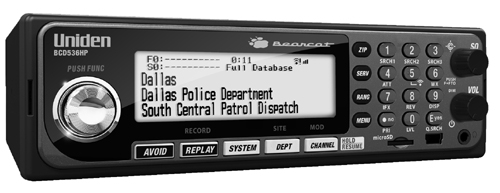 One common question people have about police scanners is whether it is against the law to listen to live police scanner audio feeds. It is not illegal to monitor police audio feeds and police scanner frequencies with radio scanners from the privacy of your own home or business. However, each state sets its own laws in regards to monitoring police radio frequencies with portable scanner radios and using online police scanner apps on smartphones. If you intend to listen to these transmissions, it is your responsibility to check with your local government agencies to find out more about the laws and regulations in your area.
One common question people have about police scanners is whether it is against the law to listen to live police scanner audio feeds. It is not illegal to monitor police audio feeds and police scanner frequencies with radio scanners from the privacy of your own home or business. However, each state sets its own laws in regards to monitoring police radio frequencies with portable scanner radios and using online police scanner apps on smartphones. If you intend to listen to these transmissions, it is your responsibility to check with your local government agencies to find out more about the laws and regulations in your area.
Why Do People Listen to Live Police Scanner Audio Feeds?
People monitor police scanner frequencies and listen to live police scanner audio feeds for various reasons. For instance, reporters and journalists rely upon these transmissions to learn about potential news stories they feel should be shared with the general public. Off duty police officers, volunteer firefighters, and other emergency responders listen to scanner chatter to know exactly what is going on, especially during emergencies, to determine whether they need to report for duty, such as during a major power outage. In addition, people use a police radio scanner to find out about accidents and traffic congestion, so they can avoid these areas and take alternate routes.
What Information Is Shared over Police Scanner Frequencies?
The information communicated over police scanner frequencies is normally limited to specific details between the dispatcher and the responding agency. For instance, if there is traffic accident, the dispatcher normally alerts police, fire, and ambulance services. Upon arrival at the scene, the responding agencies may communicate whether anyone is injured and if towing services are needed. However, more sensitive information, such as the names of those involved in the accident and extent of injuries, are communicated through other secure channels, rather than publically broadcasted over live scanner audio feeds.
How to Select the Best Police Scanner
Finding the top police scanner to use to monitor and listen to scanner communications largely depends on how and where you want to use the scanner. If you are going to be using the scanner radio at home or your business, or your local laws allow you to install it in your vehicle, a base or mobile scanner is a good choice. On the other hand, if you want a scanner to use for emergencies, or your local laws allow you to carry a scanner radio with you wherever you go, then you should consider a portable scanner. The key to selecting the best scanner is not getting distracted by the features or number of channels offered on a particular model, but ensuring the model you select is capable of picking up the radio frequencies used by your local fire, police, and other government agencies.
For further assistance in selecting an appropriate scanner compatible with the radio frequencies in your area, contact us today at 1-800-SCANNER (1-800-722-6637).



